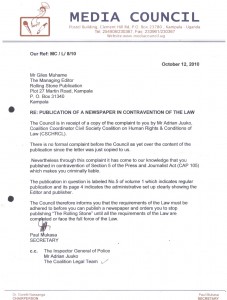Yesterday, I posted a statement from Uganda’s sexual minority community about the Anti-Homosexuality Bill, 2009. Today, I want to post a current status report and some observations.
My first post on the bill was titled, Uganda: The other shoe drops and detailed the little we knew at the time based on Ugandan news reports. Within a couple of weeks, it became clearer who in Uganda was promoting the bill (e.g., Martin Ssempa) and attention turned to American connections to those Ugandan ministers and politicians.
I started writing early (Oct 28) on this topic hoping to get some attention on these American connections as well as generate response from American evangelicals. The Facebook group (now 16,000+ members) quickly generated thousands of members involving liberals, conservatives, gays, straights, people of faith and people of no faith. At heart, it was an effort to mobilize people of faith to speak out. All of the blog posts (well over 100) can be seen here.
The current status of the bill is that it remains under consideration by the Legal and Parliamentary Affairs committee. According to Charles Tuhaise, a researcher in the Parliamentary Research service, no public hearings have been scheduled. A second reading cannot be scheduled until hearings have been conducted and a committee report has been prepared. Time is running out; the Ugandan elections are coming and the current Parliament ends inn May, 2011. Hon. David Bahati, the mover of the bill, has not responded to my questions about where he takes the bill from here.
Even though the bill seems to be stalled in committee, the effects on the daily lives of GLBT people in Uganda are quite negative. As noted in the statement yesterday from Sexual Minorities Uganda, since the bill was introduced conditions have worsened for them. Even though the bill has not moved, that has not stopped bill supporters such as Julius Oyet, David Kiganda, and Martin Ssempa from preaching stereotypes about gays and continuing what Martin Ssempa called “the war.”
Due to the ongoing efforts of Ssempa and allies, attention has turned to the Americans which support these Ugandan preachers. Julius Oyet has been supported in the past by an Atlanta area church, New Gate International Church, headed by Apostle Venessa Battle. Rev. Battle is one of the approved apostles listed in C. Peter Wagner’s International Coalition of Apostles. Last month, when I called New Gate, a representative there said the church has support Rev. Oyet in the past but declined to say to what degree. She also said she would provide a statement regarding Rev. Oyet’s support for the Anti-Homosexuality Bill, but never followed up.
The most prominent American church involved with a Ugandan leader in the anti-gay movement is Canyon Ridge Christian Church. Canyon Ridge leaders told me recently that they continue to evaluate their stance and may have a new statement soon. The fallout from the AHB has been substantial for CRCC. They have experienced unflattering national attention to their support for Martin Ssempa, and the loss of two community partnerships with AIDS related groups – Southern Nevada Health District and Aid for AIDS Nevada. One group, the Human Rights Campaign – Las Vegas met with Canyon Ridge leaders in September but has not said anything publicly about the church’s stance on the AHB. The HRC-LV has not responded to repeated requests for information about their stance on the AHB or CRCC’s support for Martin Ssempa.
There are many other American connections I could raise (e.g., Lou Engle, College of Prayer). Overall, Uganda’s AHB has become a point of division for American evangelicals. Some evangelicals believe criminalization of homosexuality would be a good thing (most recently the Tea Party darling, David Barton), while others (e.g., Rick Warren) do not. (Count me squarely on the side that believes the state has no business regulating such behavior.) And as indicated by Barton’s comments, one year later, the issues raised by the AHB in Uganda are still alive in American politics as well.

